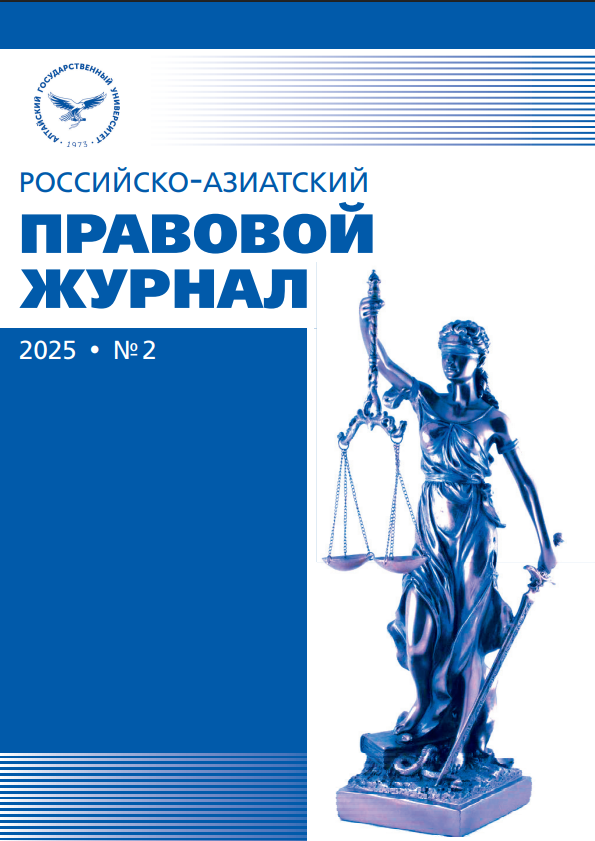LEGAL REGULATION OF FOREIGN ECONOMIC ACTIVITY OF THE RUSSIAN FEDERATION IN THE ASIAN REGION
УДК 347.72:339.5 ББК 67.932.11
Abstract
The countries of the Asian region are of great importance for cooperation in the political, economic,cultural and humanitarian spheres. The Russian Federation has developed relations of mutual respect andpartnership with many Asian countries. A regular dialogue has been established at the highest level, whichimplies constructive and mutually beneficial relations. And today it is especially important to cooperate withAsian countries in order to weaken and bypass pressure from Western countries. The authors of the articleexamined the legal regulation of Russia's foreign economic activity in the Asian region in order to assess thecurrent development of foreign economic cooperation in this region. For the normal development of bilateralrelations, especially against the backdrop of rapidly growing global tensions, it is important to establish clearrules for regulating the conduct of international commercial transactions at the government level. Governmentstructures of Asian countries and state authorities of Russia will play a primary role in these processes.However, for this purpose it is also possible to involve the community of scientists, individual specialistsand organizations working in the field of relations between Russia and Asian countries. At the same time,Russia can act here as a leader of Eurasian integration, continuing to develop relations with Asian countries, drawing into its orbit those countries with which relations are still at an insufficiently high level. For example,through the creation of an integrated energy complex, implementing joint projects in the energy and othereconomically important areas.
Downloads
References
2. Безбах В.В., Одинцов С.В., Добрынин И.Г. Особенности правового регулирования внешнеторговых сделок между российскими и китайскими предприятиями // Евразийское научное объединение. 2020. №59. С. 110–112.
3. Конвенция ООН о международной купле-продаже товаров (Вена, 11 апреля 1980 г.) // НПП «Гарант-сервис-университет». URL: https://base.garant.ru/10104469/
4. Сайт газеты Коммерсант. /URL: https://www.kommersant.ru/doc/2724560
5. Гражданский кодекс РФ (ч. 2) от 26 января 1996 г. №14-ФЗ // Собрание законодательства РФ. 1996. №5. Ст. 410.
6. Об основах государственного регулирования внешнеторговой деятельности: № 164-ФЗот 08.12.2003. Ст. 2 // КонсультантПлюс. URL: https://www.consultant.ru/document/cons_doc_ LAW_45397/
7. О внешней торговле: Закон КНР от 12.05.1994 г. Ст. 1. URL: https://chinalaw. center/business_law/ china_foreign_trade_law_revised_2016_russian/
8. Тюленева Т.И., Курашова Е.А. Анализ торгово-экономических отношений России и Индии // Экономика: вчера, сегодня, завтра. 2021. Т. 11. № 11А. С. 351–357.
9. Аргынгазинов А.А. Внешняя торговля Казахстана: современные тенденции и особенности экспорта // Российский внешнеэкономический вестник. 2021. №6. С 23–32.
10. Официальный сайт Министерства иностранных дел Российской Федерации. URL: https://www. mid.ru/ru/foreign_policy/international_contracts/international_contracts/2_contract/61944/
11. Протокол о применении Договора о зоне свободной торговли от 18 октября 2011 г. между его Сторонами и Республикой Узбекистан (Подписан в г. Минске 31.05.2013) // КонсультантПлюс. URL: https://www.consultant.ru/document/cons_doc_LAW_161454/
REFERENCES
1. Volovik N. P., Prikhodko S. V. Trade policy of the BRICS countries // Fundamental and Applied Research in the Modern World. 2014. №15–2. P. 194–196.
2. Bezbakh V.V., Odintsov S.V., Dobrynin I.G. Peculiarities of legal regulation of foreign trade transactions between Russian and Chinese enterprises // Eurasian Scientific Association. 2020. №59. P. 110–112.
3. UN Convention on the International Sale of Goods (Vienna, 11 April 1980) // NPP “Garant-serviceuniversity”. URL: https://base.garant.ru/10104469/
4. Kommersant newspaper website. URL: https://www.kommersant.ru/doc/2724560
5. Civil Code of the Russian Federation (P. 2) of 26 January 1996 №14-FZ // Collection of Legislation of the Russian Federation. 1996. №5. Аrt. 410.
6. On the basis of state regulation of foreign trade activity: Art. 2 № 164-FZ from 08.12.2003 // ConsultantPlus. URL: https://www.consultant.ru/document/cons_doc_LAW_45397/
7. On Foreign Trade: Art. 1 of the Law of the People's Republic of China dated 12.05.1994. URL: https:// chinalaw. center/business_law/china_foreign_trade_law_revised_2016_russian/
8. Tyuleneva T.I., Kurashova E.A. Analysis of trade and economic relations between Russia and India // Economics: yesterday, today, tomorrow. 2021. Vol. 11. № 11A. P. 351–357.
9. Argyngazinov A.A. Foreign trade of Kazakhstan: current trends and features of exports // Russian foreign economic bulletin. 2021. №6. P. 23–32.
10. Official website of the Ministry of Foreign Affairs of the Russian Federation. URL: https://www.mid. ru/ru/foreign_policy/international_contracts/international_contracts/2_contract/61944/
11. “Protocol on the application of the Treaty on Free Trade Zone of 18 October 2011 between its Parties and the Republic of Uzbekistan” (Signed in Minsk 31.05.2013) // ConsultantPlus. URL: https://www.consultant.ru/document/cons_doc_LAW_161454/
Copyright (c) 2025 Е. Ю. Коваленко, А. И. Грецов

This work is licensed under a Creative Commons Attribution 4.0 International License.
Russian-Asian Law Journal is a golden publisher, as we allow self-archiving, but most importantly we are fully transparent about your rights.
Authors may present and discuss their findings ahead of publication: at scientific conferences, on preprint servers, in public databases, and in blogs, wikis, tweets, and other informal communication channels.
Russian-Asian Law Journal allows authors to deposit manuscripts (currently under review or those for intended submission) in non-commercial, pre-print servers such as ArXiv.
Authors who publish with this journal agree to the following terms:
- Authors retain copyright and grant the journal right of first publication with the work simultaneously licensed under a Creative Commons Attribution License that allows others to share the work with an acknowledgement of the work's authorship and initial publication in this journal.
- Authors are able to enter into separate, additional contractual arrangements for the non-exclusive distribution of the journal's published version of the work (e.g., post it to an institutional repository or publish it in a book), with an acknowledgement of its initial publication in this journal.
- Authors are permitted and encouraged to post their work online (e.g., in institutional repositories or on their website) prior to and during the submission process, as it can lead to productive exchanges, as well as earlier and greater citation of published work (See The Effect of Open Access).








